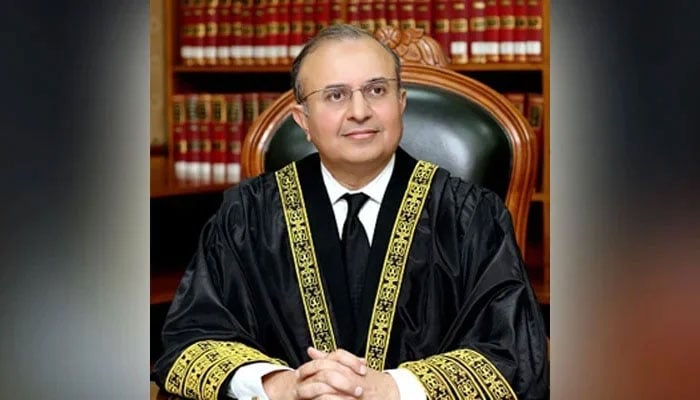Alternative dispute resolution should be encouraged to lessen burden on courts, Justice Mansoor tells American varsity
Pakistani consul general followed with his welcoming remarks, after which Justice Shah addressed the gathering
The East-West University, Chicago, recently hosted a talk by senior puisne justice of the Supreme Court of Pakistan Justice Mansoor Ali Shah on the need for judicial reforms in Pakistan.
The event, which took place on May 12, was attended by Pakistani Consul General in Chicago Tariq Karim, Adviser on Arts to United States President Joe Biden Shahid Ahmed Khan, Judge of the Immigration Court in Chicago Samia Naseem, neurologist Dr Teepu Siddique, head of Islamic studies at the Loyola University, Chicago Prof Marcia Hermansen, Islamic scholar Dr Tanveer Azmat, legal executive Dr Nabeela Rasheed, filmmaker Sadia Uqaili, AI expert Vicar Sayeedi, investment adviser Jafer Hasnain, entrepreneur Ashraf Lakhany, member of the Board of Trustees of East-West University Tariq Junejo, leading social services provider Arshia Hasnain and others, including academics, businesspersons, postgraduate students, Pakistani community leaders and key staff of the varsity.
The event was moderated by Dean Zafar Malik. The event commenced with the arrival of Justice Shah. Dr M Wasiullah Khan gave the welcome address and provided a brief history of the East-West University. The Pakistani consul general followed with his welcoming remarks, after which Justice Shah addressed the gathering. The Supreme Court senior puisne judge presented the case for judicial reform and stressed the need for reducing the time to resolve cases. He said that the protracted duration of cases rendered many outcomes ineffective. He advocated integrating new technology to significantly reduce case resolution time, making justice more meaningful.
Technology and AI integration could streamline litigation processes and enhance the legal community’s efficiency, Justice Shah said as he underscored the importance of maintaining the judiciary’s independence and implementing people-centric reforms to save time and expenses for the public. He noted that the current system relied heavily on individuals, placing an undue burden on the chief justice to manage the entire system. This system, he argued, must change. Justice Shah advocated for increased arbitration use, which was well-defined in older laws but needed to be updated to encourage alternative dispute resolution (ADR) routes, reducing the burden on the courts. He also criticised lawyers’ frequent requests for adjournments, which drained the legal system’s limited resources and complicated ordinary people’s lives. He stressed the need for maintaining judicial independence and protecting the judiciary from external pressures.
All the reforms must be people-centric, the Supreme Court senior puisne judge remarked. He added that current affairs and politics often overshadowed the judiciary’s work. Responding to a question from the audience, Justice Shah remarked that the judiciary’s role in interpreting laws rather than making them was particularly enlightening. This clarified a common misconception and helped the audience understand the boundaries within which the courts and judges operated. He also specified the judiciary’s responsibilities versus those of the legislature. Later, he was presented with the Chancellor’s Award for Excellence for his dedication to the pursuit of justice.
-
Modi’s oath-taking: Pakistan has received no invitation, says FO
Sources pointed out that Pakistan will be represented in the ceremony through its Charge d’Affaires Saad Warriach,...
-
BJP govt to depend on parties that don’t hate minorities: Sherry
“Because of this, India’s Muslims and other minorities will probably get a chance to have a sigh of relief for...
-
PHC moved against KP ombudsman’s appointment
A two-member PHC bench comprising Justice SM Attique Shah and Justice Shakeel Ahmad heard the petition
-
APTMA urges PM to expedite release of consignments of imported cotton
Industry faces severe challenges due to the illegal actions of the Directorate General of the Department of Plant...
-
 King Charles Sends Clear Cut Message To Prince Harry: 'never Allowed Back'
King Charles Sends Clear Cut Message To Prince Harry: 'never Allowed Back' -
 Harry, Meghan Branded 'frauds' Over Their School Plans For Archie, Lilibet
Harry, Meghan Branded 'frauds' Over Their School Plans For Archie, Lilibet -
 Namibia Opt To Bat First Against Scotland After Winning Toss
Namibia Opt To Bat First Against Scotland After Winning Toss -
 Queen Camilla, Brigitte Macron Go Viral For THIS Reason
Queen Camilla, Brigitte Macron Go Viral For THIS Reason -
 Prince Harry, Meghan Markle Warned About Their Big Move
Prince Harry, Meghan Markle Warned About Their Big Move -
 Princess Eugenie Reveals Her Childhood Fear In New Post
Princess Eugenie Reveals Her Childhood Fear In New Post -
 Malala Yousafzai Reiterates Ceasefire Call As Israel Attacks Gaza School
Malala Yousafzai Reiterates Ceasefire Call As Israel Attacks Gaza School -
 Babar Azam Takes Lead Over Virat Kohli As T20Is' Highest Run-scorer
Babar Azam Takes Lead Over Virat Kohli As T20Is' Highest Run-scorer
